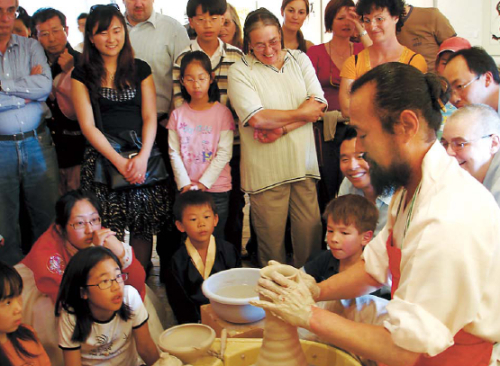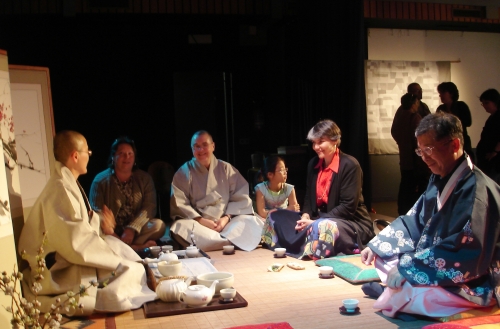Swiss Buddhist nun talks about her love and concerns for Korea, where she lived for 14 years
GENEVA ― It is a strange experience to meet a Buddhist nun, who calls herself a lover of Korean culture, on the main street in Geneva.

Donned in her grey Buddhist robes, Ven. Mujin steps into the cafe nearby the train station. Then she starts complaining.
“Somebody left food here,” she points to the table, before curling herself onto the leather sofa. Though she speaks with bright smiles, warmth and grace, there is something cynical in her voice. She clears her throat before ordering a cup of coffee.
GENEVA ― It is a strange experience to meet a Buddhist nun, who calls herself a lover of Korean culture, on the main street in Geneva.

Donned in her grey Buddhist robes, Ven. Mujin steps into the cafe nearby the train station. Then she starts complaining.
“Somebody left food here,” she points to the table, before curling herself onto the leather sofa. Though she speaks with bright smiles, warmth and grace, there is something cynical in her voice. She clears her throat before ordering a cup of coffee.

Buddhist nuns drink coffee? This is also quite strange. But the real shock comes next.
“I gave up on Korea, and Korean culture,” she says with a calm demeanor.
This comment is certainly not expected, especially from someone who spent more than 14 years in Korea.
Ven. Mujin was born in England and studied in Switzerland before her conversion to Buddhism. She became a Buddhist nun in Sri Lanka in 1976. Since then, she has studied with a variety of gurus from around the world.
She initially wanted to be a Chinese Buddhist. But in 1984, after she first visited Korea, everything changed.
“I just liked Korea and the Korean people. And I found my personality fits very well with Korean culture,” the Swiss nun says. So she decided to transfer to Korean Buddhism. Ven. Munji lived in Korea for 14 years until 1998, when she returned to Switzerland.
“I had to come back to look after my parents,” she says.
Mujin now runs Popkyesa, a house-temple, in La Sarraz, a small Swiss town in Lausanne, where she has a Buddhist lecture meeting every month.
“I don’t have many visitors but some Koreans and locals come to my temple and I teach them very basic Buddhism.”
Although Mujin now lives in Switzerland, she is still involved in several projects in Korea and regularly visits the country.
Most recently, the nun spent three months in Yongin, Gyeonggi Province, as a dean of the Buddhist School of International Studies.
The school run by Jogye Order of Korean Buddhism opened in March as the country’s first English-speaking school for “Bikkunis,” or Buddhist nuns.
The aim of the school, she says, is to train nuns who will be able to propagate Korean Buddhism among foreigners.
“The school is designed not to cultivate fluent English speakers but to cultivate nuns who can propagate dharma internationally,” says the 60-year-old nun.
She is ambitious, worked hard in designing the right curriculum for the school. She wanted to produce nuns who could translate, moderate international events and also guide temple-stay programs for foreigners. She says, however, she has given up on the dream.
“I’m done. I’m resigned,” she says firmly. Why?
“No comment,” she says, declining to go into detail, but admits that she had some problems working with the Korean Buddhism organization.
“Your Korean hierarchy is one of the problems of Korean character,” she finally says.
Yet despite saying she has given up on Korea, she can’t stop talking about the country, looking a little bemused, especially when she talks about the Korean festival in Switzerland.
In 2007, Ven. Mujin organized a week-long Korean festival in Lausanne and in Geneva, inviting traditional artists from calligraphers, potters and “hanbok,” Korean traditional clothes, designers.


“I have a friend, Jawoo sunim, and her sister is a well-known calligrapher. And she introduced me to different people. So I thought, ‘Oh what fun, let’s bring them to Switzerland,’ because people here are not familiar with Korean culture,” she says.
She rented a wide-open space in her local town, and had a hanbok exhibition.
Munjin even brought a “daegum,” Korean traditional flute, player to create the right atmosphere.
“It was very well received. People really liked it. They knew nothing about Korean music, Korean clothes. But they thought things were very beautiful,” she smiles.
She seems very proud of her experience.
“My problem was, though, it was too short, so people came afterwards, saying ‘Oh we want to see them again,’ but that was it.”
The Swiss nun wanted to make the Korean festival an annual event, but was unable to organize it again due to lack of support.
“I asked the Korea Foundation for a help, but they didn’t give me a single won,” she complains bitterly.
The Swiss nun claims that the organization often ignores small but important events, while pouring money into some major universities and museums.
Ven. Mujin insists that the real beauty of Korea, in fact, often comes from small things such as “norigae,” Korean traditional ornaments, or “beoseon,” traditional socks.
“There are some senses of elegance in Korean traditional clothes, but in some, how it has lost a lot in today.”
“I have written articles about norigae and beoseon. I tried to persuade various publishers to make a book about it. But the answer is always the same, ‘Oh, sunim, nobody is interested in it, it’s useless. I couldn’t do it by myself, so I said forget it.
“I think Korea has a lot to offer in culture. There are so many wonderful things in Korean traditional culture,” she says.
“You still have this inferiority complex that ‘our culture is rubbish.’ It’s such a shame. It’s really a shame.” Her comment is bitter and angry but revealing.
She is scathing in her criticism of Christianity in Korea: She believes it is one of the biggest problems in Korean society.
“Because of your very extreme Christianity, Korean culture cannot go any where,” she says.
Her message is that Korean Buddhism is also part of Korean culture, but some Christian organizations disregard Buddhism and try to root out its inheritance.
Her solution is that all of the region should cooperate in the spirit of openness and love of the country.
“Koreans need to learn how to work and live with others,” she says.
Also, she says that Koreans still need to learn how to be with foreigners comfortably.
“I’m not saying not to be a Korean, but be a Korean, but be able to live with others freely and comfortably.
“You also need cultural ambassadors to travel around the world, talk and share about Korea,” she adds.
Would she be happy to become the Korean ambassador?
“I’m a Korean-ordained Buddhist. That’s my life I can’t live without Korean culture,” she says.
By Oh Kyu-wook, Korea Herald Correspondent
(596story@heraldcorp.com)



![[Herald Interview] 'Amid aging population, Korea to invite more young professionals from overseas'](http://res.heraldm.com/phpwas/restmb_idxmake.php?idx=644&simg=/content/image/2024/04/24/20240424050844_0.jpg&u=20240424200058)












![[KH Explains] Korean shipbuilding stocks rally: Real growth or bubble?](http://res.heraldm.com/phpwas/restmb_idxmake.php?idx=652&simg=/content/image/2024/04/25/20240425050656_0.jpg&u=)

